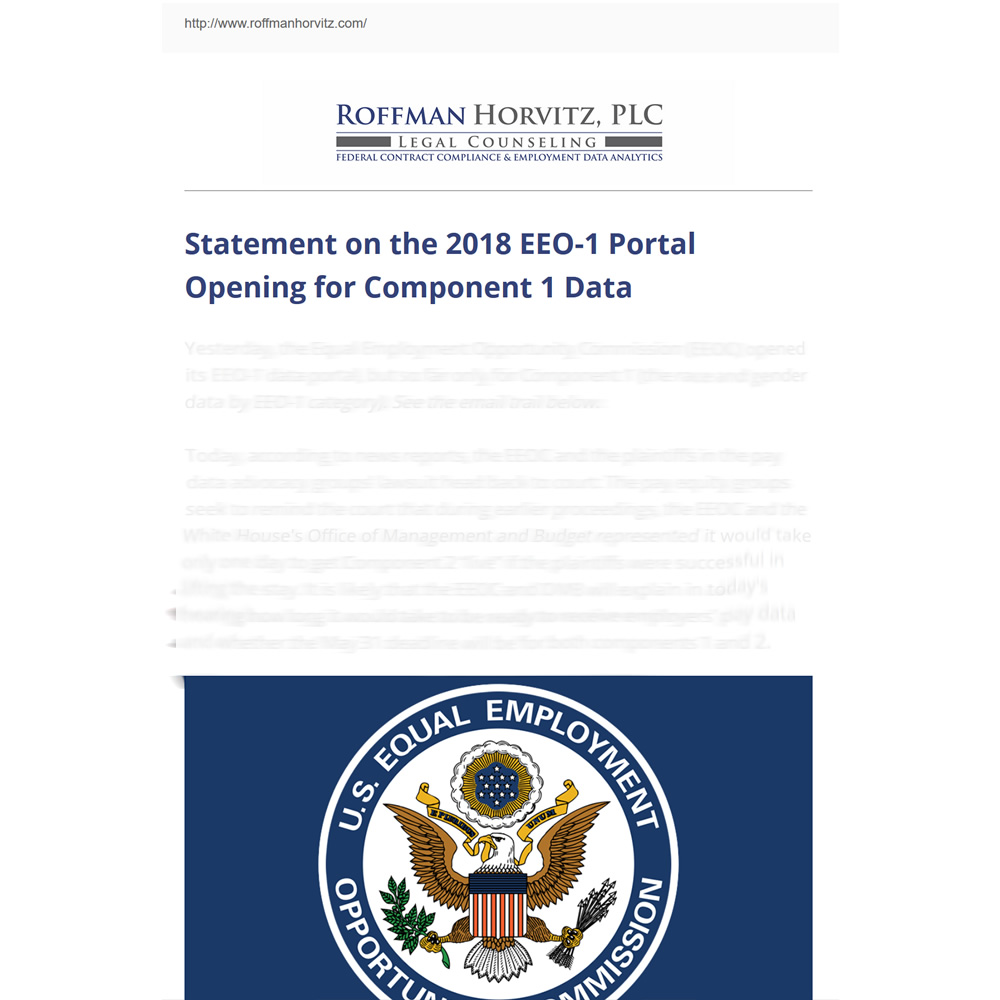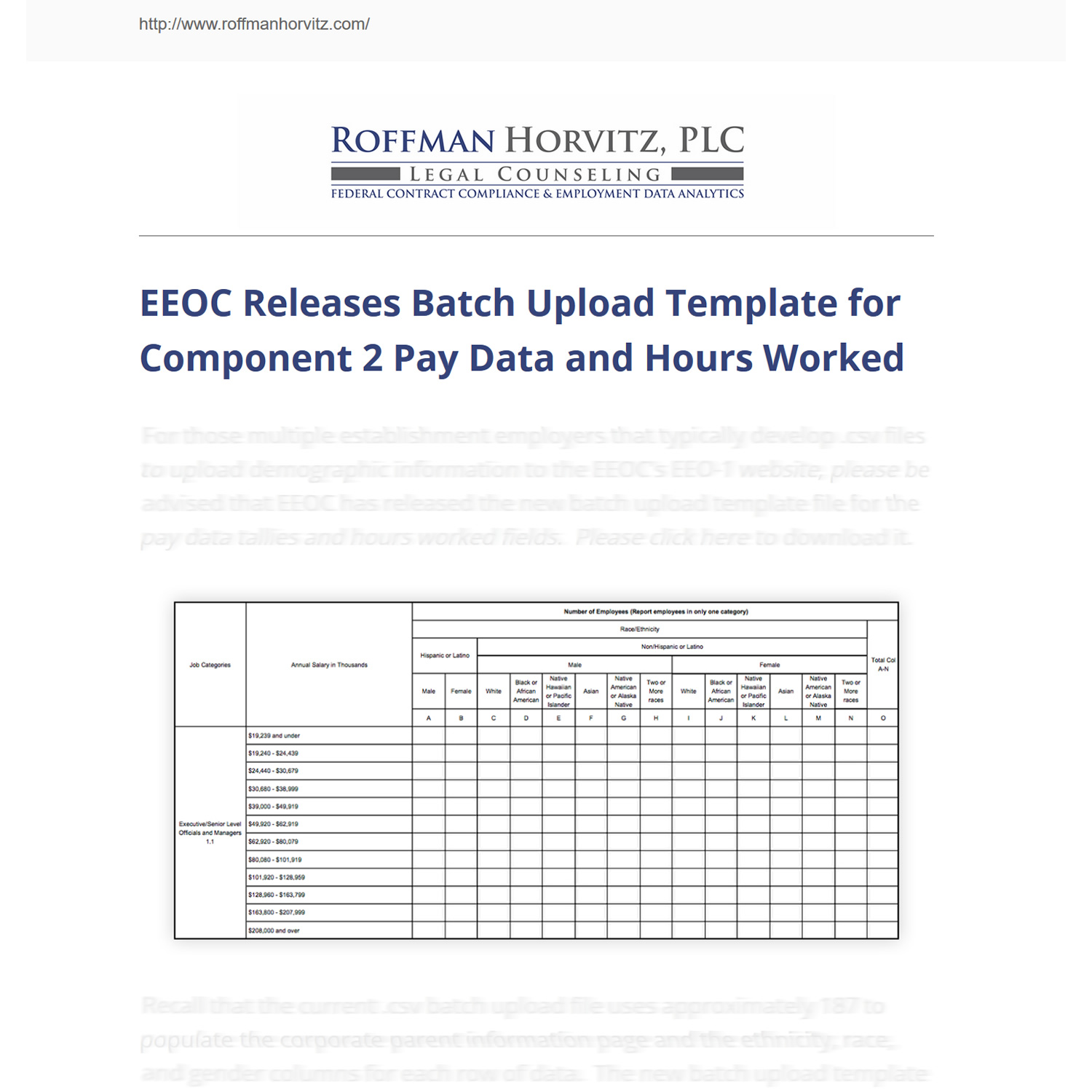OFCCP Finalizes Pay Transparency Rule Prohibiting Pay Secrecy Policies

On September 10, 2015, OFCCP announced the release of the Final Rule implementing the Pay Transparency Executive Order (E.O. 13665). The Final Rule prohibits federal contractors and subcontractors from maintaining pay secrecy policies and from discriminating against employees and applicants for communicating regarding compensation. The Final Rule will take effect on January 11, 2016, and will apply to employers entering into new, or modifying existing, federal contracts in excess of $10,000 after the effective date.
What Must Contractors Do?
- Contractors must include the updated reference to the equal opportunity clause in their subcontracts. Contractors may incorporate the nondiscrimination obligations by using flow down language such as "We incorporate by reference the Equal Employment Opportunity provisions of 41 C.F.R. Section 60-1.4." If the contractor's current flow down language reads: "We incorporate by reference the Equal Employment Opportunity provisions of 41 C.F.R. Section 60-1.4(a)(1)-(7)," then the contactor needs to change that cross reference to read (1)-(8) because OFCCP added a new subsection to the Equal Opportunity Clause. If the contractor previously has set out the seven paragraphs in full, it must revise the order of the paragraphs to insert new paragraph (3) to the clause, and re-number old paragraphs (3)-(7) as new paragraphs (4) – (8). New paragraph (3) states:
The contractor will not discharge or in any other manner discriminate against any employee or applicants because they have inquired about, discussed, or disclosed their own pay or the pay of another employee or applicant. However, employees who have access to the compensation information of other employees or applicants as a part of their essential job functions cannot disclose the pay of other employees or applicants to individuals who do not otherwise have access to compensation information, unless the disclosure is (a) in response to a formal complaint or charge, (b) in furtherance of an investigation, proceeding, hearing, or action, including an investigation conducted by the employer, or (c) consistent with the contractor's legal duty to furnish information.
- Contractors similarly must update manuals, policies, handbooks, intranet pages, home pages, and applicant tracking landing pages by inserting the new nondiscriminatory language in full:
The contractor will not discharge or in any other manner discriminate against employees or applicants because they have inquired about, discussed, or disclosed their own pay or the pay of another employee or applicant. However, employees who have access to the compensation information of other employees or applicants as a part of their essential job functions cannot disclose the pay of other employees or applicants to individuals who do not otherwise have access to compensation information, unless the disclosure is (a) in response to a formal complaint or charge, (b) in furtherance of an investigation, proceeding, hearing, or action, including an investigation conducted by the employer, or (c) consistent with the contractor's legal duty to furnish information.
- Contractors must disseminate the new nondiscrimination provisions, keeping in mind that the dissemination also covers applicants. OFCCP's Frequently Asked Question directs contractors to disseminate the new language either by electronic posting or by posting copies of the provision in conspicuous places available to employees and applicants for employment.
- Contractors must display a new poster that OFCCP calls a "supplement":
https://roffmanhorvitz.com/documents/roffman-horvitz-plc-2018-dol-ofccp-2015-10-ofccp-eeo-supplement-final-jrf-qa-508c.pdf
This new link is not the same as the "EEO is the Law Poster." It is a supplement. Once the EEOC and OFCCP finalize the newer version of the "EEO is the Law Poster," covered government contractors will be required to display the new poster, too. In the interim, employers should go to the link above and obtain the supplement for posting on bulletin boards and linking as appropriate on intranet and applicant tracking system landing pages.
- Finally, contractors need to ensure that supervisors and managers have a clear understanding of the types of actions and behaviors that could lead to complaints of discrimination under the new rule, and thus how to avoid these situations ahead of time. Although OFCCP is not mandating any training obligation, OFCCP encourages employers to train recruiters, interviewers, and managers on the rule's parameters as a best practice. An internal training or collective group review of OFCCP's new FAQs is one idea. Any training should cover how to apply OFCCP's FAQs to the employer's specific workplace environment, policies, and existing rules.
More Context Regarding the Legal Issues That the Final Rule Presents
The purpose of the rule was to ensure that employees and applicants are permitted to discuss compensation, and thus any contractor practices or policies providing for pay secrecy now are prohibited.
The rule contains five important legal concepts that Human Resources, Counsel and Supervisors/Managers need to understand:
- Which employees of the contractor have, as the essential functions of their job, the obligation to protect the confidentiality of individual pay?
- Are there limitations on an employer's disciplinary action against employees who are supposed to protect the confidentiality of pay, but divulge it?
- If discussing pay is permitted, but employees are also violating workplace rules in doing so, what recourse, if any, does an employer have to enforce its rules?
- If an employer is accused of terminating someone in violation of this new Pay Transparency Rule, how is OFCCP going to establish its case and how do the employer's defenses come into play?
- What kinds of employer policies relating to the confidentiality of pay still may be promulgated and enforced?
Essential Functions
The Final Rule uses categories or factors to determine whether a job or job function falls under the definition of "essential job functions." These categories are: (1) the access to compensation information is necessary in order to perform that function or another routinely assigned business task; or (2) the function or duties of the position include protecting and maintaining the privacy of employee personnel records, including compensation information.
If an employer plans to take disciplinary action against an employee for disclosure of compensation information, the employer must be certain that the employee falls within one of the above categories. The employer may take disciplinary action up to and including termination of employees which have as their essential job functions maintaining compensation information confidentiality or which require access to the compensation information in the performance of a routinely assigned business task. Employers must keep in mind that the determination of whether any particular employee received compensation information in the course of their "essential job functions" will be determined on a case-by-case basis by OFCCP.
Employees whose essential function it is to protect the confidentiality of this information of course may divulge it in response to a court order, an administrative agency's request, or in response to discovery requests in litigation.
What is the "Essential Functions" Defense?
The essential functions defense may be used only in situations where compensation information has been divulged by someone whose job it was to maintain it confidentially. OFCCP's Frequently Asked Questions explain that if a janitor comes upon confidential employee information and divulges it, it would be a violation of the new rule for the employer to discipline the janitor for divulging it. The janitor's actions are protected, but a human resource manager's actions would not be protected. OFCCP explains:
The position of a human resource manager who has access to the sensitive compensation information of others within an organization is an example of a job that would fall under the Final Rule's definition of "essential job functions." In this particular example, a human resource manager is authorized access to compensation information to perform routinely assigned business tasks. A human resource manager may also have a duty to protect this type of information from disclosure. Therefore, a human resource manager who discloses or discusses the compensation of applicants or employees, based on information that the manager obtained through the performance of his or her job, is not protected under the Final Rule.
In contrast, a janitor's job functions would not meet the Final Rule's definition of "essential job functions." If the primary purpose of the janitor's position is to clean (i.e., sweep, dust, vacuum), doing so does not require the janitor to access confidential compensation information. Similarly, merely cleaning does not require the janitor to maintain the privacy of personnel records. Finally, janitors are not typically authorized to access compensation information. The contact with the compensation information must be more than incidental; therefore, if the janitor discloses or discusses the compensation of applicants or employees, the janitor's actions would be protected under the Final Rule.
What is the "Workplace Rule" Defense?
A contractor may pursue the "workplace rule" defense if the contractor's adverse action is for enforcement of a rule unrelated to compensation disclosure. The "workplace rule" defense would shield contractors from liability if a contractor proved that it disciplined an employee for violation of a consistently and uniformly applied rule that did not prohibit or tend to prohibit discussion of compensation.
Concerned for their ability to enforce legitimate workplace rules, contractors submitted comments to OFCCP suggesting that the word "uniformly" be deleted from the rule, on the ground that circumstances often warrant different approaches. However, the Final Rule maintains the "uniform" language on the reasoning that the defense must require the contractor to show consistent and uniform application in order to prevent contractors from using an unrelated workplace rule as pretext for discrimination.
Contractors can certainly administer discipline at different levels of severity. However, the difference in severity cannot be due to the protected activity of compensation disclosure, and similarly situated employees must be disciplined similarly.
The Employer's Burden in Response to a Complaint
Despite contractor advocacy for the "but for" causation standard, OFCCP adopted the burdens and standards of proof applicable to Title VII discrimination claims, including the use of a motivating factor framework for analyzing causation.
- The employee must demonstrate that discrimination was a motivating factor in the employer's action.
- Then the employer has a defense of demonstrating that it would have taken the same action even in the absence of protected conduct.
Under the "motivating factor" framework, a court has discretion to grant injunctive and declaratory relief against an employer, even if the employer succeeds. The final rule does not permit OFCCP to recover attorneys' fees and costs under the "motivating factor" framework.
It is important to note that, while the Final Rule maintains the motivating factor approach as a permissible approach, the Final Rule explains that plaintiffs may also proceed under the traditional burden shifting, "determinative factor," approach.
- Under this approach, the plaintiff must make a prima facie showing of discrimination, proving protected class status and adverse action.
- Then, the employer has the opportunity to articulate a legitimate nondiscriminatory reason for the adverse action.
- In order to succeed, the plaintiff must demonstrate that the reason provided by the employer was pretextual.
OFCCP will decide which approach to use based on the facts of the case.
- For instance, where an employer can show that it fired an employee in part for returning late from lunch, but where there is also evidence that the firing was motivated by discussing compensation, OFCCP is likely to use the motivating factor approach.
- In contrast, if evidence points to only one motive, the employer firing the employee for excessive breaks, but OFCCP has evidence to disprove this, OFCCP might proceed under the "determinative factor" approach.
OFCCP also has in its discretion to proceed under both frameworks, asserting that discrimination was the "determinative factor" in the employment action, but, alternatively, that there was at least a mixed motive including discrimination.
High Stakes for Employer Missteps
The stakes are high for employers:
- There is no limitation on monetary relief to the employee under the "determinative factor" approach.
- Under the motivating factor approach, if OFCCP is able to demonstrate partial motivation, but the employer is able to establish other lawful justifications for the employment action, the employer can be held liable, but OFCCP cannot pursue back pay or reinstatement.
- OFCCP's discretion in its approach will depend, from the outset, on the strength of the discriminatory motive and the possibility of existence of lawful justifications for the employment action.
Thus, contemporaneous, thorough documentation of legitimate, non-discriminatory justifications with regard to every employment action is critical for contractors to establish their defenses.
Permissible Employer Policies
The Final Rule does not require contractors to make any additional disclosures about what they pay their employees. Covered contractors are only prohibited from discharging, or in any other manner discriminating against, any employee or applicant for employment because the employee or applicant inquired about, discussed, or disclosed their own compensation or the compensation of others, subject to the defenses in the rule.
Thus, if an applicant is in an interview with a hiring manager, and the applicant wants to know what other employees in the same job title earn, the hiring manager is not obligated to reveal that information. The OFCCP gave no other examples of how interviewers may react to questions from applicants regarding compensation information during the job application process, and did not answer questions submitted during its web seminar as to whether employers nonetheless could face discrimination allegations for deciding not to hire an applicant who tries to learn the compensation of existing employees at an inappropriate stage of the employer's hiring process.
Download PDF of Client Update
